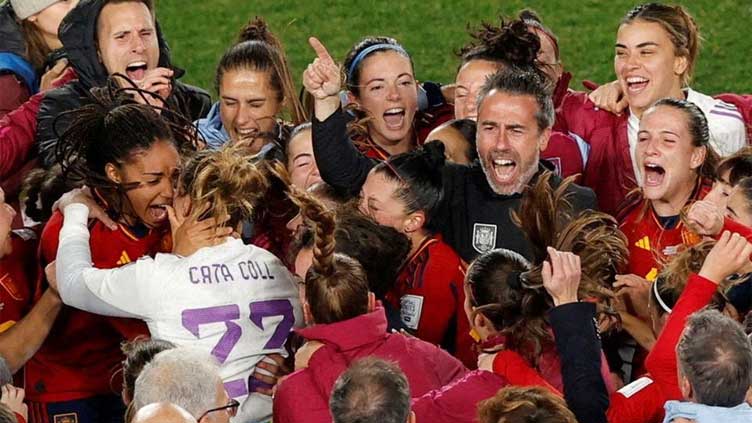Spain players decry 'systematic discrimination' toward women's team

Sports
Spain defender Irene Paredes said "we still can't see the light at the end of the tunnel"
GOTHENBURG, Sweden (Reuters) - Spain's women soccer players said on Thursday the fight they have waged with the country's football federation (RFEF) followed decades of "systematic discrimination" and they hoped that it would inspire others to stand up for their rights.
Two-time Ballon d'Or winner Alexia Putellas said the kiss on the mouth of team mate Jenni Hermoso by then RFEF President Luis Rubiales during the World Cup and his subsequent refusal to resign was the "straw that broke the camel's back" that prompted the players to boycott playing for the team until leadership changes were made at the federation.
Following negotiations that went on into the early hours of Wednesday, a majority of players agreed to end their boycott.
"We had been demanding that they listen to us for quite some time because we already knew that there had been systematic discrimination with the women's (team) for many decades," Putellas said at a press conference ahead of a Nation's League match against Sweden on Friday.
"We had to fight a lot to be heard."
Between six and nine senior officials of the football federation will be invited to leave their jobs or will be sacked, a source told Reuters on Wednesday, shortly before the federation announced it had sacked its Secretary General Andreu Camps.
Rubiales, who was suspended by FIFA from his roles at the RFEF and the vice presidency of UEFA, eventually resigned as he faces investigation by a court for assault and coercion over the kiss. Rubiales claimed that Hermoso has consented to the kiss but she denied this.
Jorge Vilda, the coach who guided Spain to glory in the Women's World Cup, was dismissed earlier this month. Spain defender Irene Paredes said the players could see there were already improvements being made but that "we still can't see the light at the end of the tunnel."
She said the players were aware that this was to moment to strike while they "held the loudspeaker" and that their stand could help other women suffering discrimination.
"We have many people behind us, many colleagues from other teams, colleagues from other sports and women in their jobs, in their lives who are suffering similar cases and we want this to be a point... where they look at each other and can raise their voices and say this has happened to me too," Paredes said.
Paredes said the players had felt alone during much of the standoff and that while they were grateful for the Spanish government's intervention this week, she criticised them for being slow to weigh in.
The call-up by new coach Montse Tome for the match against Sweden on Friday and against Switzerland next week had caught many players by surprise after they had said they would not be available.
Speaking at a separate press conference at the same venue, Tome defended her actions, saying that her claim she had spoken to all the players had been misinterpreted. She had only spoken to some of the players, she said.
Amid local media reports that the RFEF is also considering whether to remove Tome, she said she had not heard the players say they do not want her as their coach. "I am confident in our work and want this situation to be resolved," Tome said. Putellas said the players had not asked for Tome to be sacked.

